Jump to Section
Introduction
Can a toothache cause ear pain? When you’re dealing with a toothache, the pain often feels like it’s limited to your mouth. But what if the discomfort you’re experiencing isn’t just confined to your teeth? Many people are surprised to learn that a toothache can also cause ear pain. This connection is not just a coincidence — it’s a complex phenomenon that involves your nerves, jaw, and even your sinuses. If you’ve ever experienced pain radiating to your ear while struggling with a toothache, you might be wondering if there’s a deeper issue at play.
Ear pain from a toothache is more common than you might think. While it’s easy to assume that earaches are solely related to infections or other ear issues, dental problems can sometimes trigger discomfort in your ear as well. The proximity of your teeth, jaw, and ear, combined with shared nerve pathways, makes it possible for jaw pain to manifest as earache. Whether it’s a tooth infection, a misaligned jaw, or another underlying issue, the relationship between these two types of pain is something worth exploring.
In this blog post, we’ll dive deep into how a toothache can cause ear pain and what you can do to address both issues. Understanding the cause behind these symptoms can help you find the right treatment and prevent further complications. Let’s explore this hidden connection and what it means for your overall health.
Understanding the Connection Between Toothache and Ear Pain
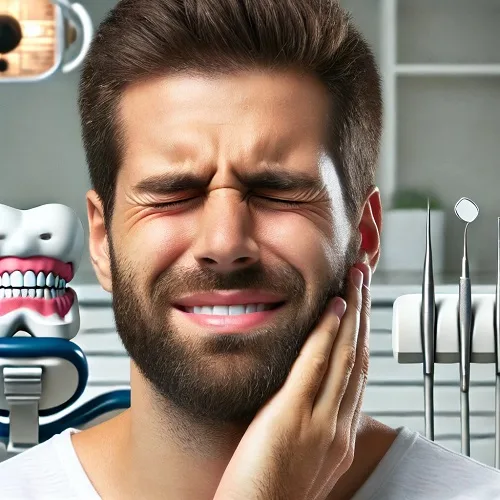
It may seem odd to think that a toothache could cause ear pain, but the two are more connected than you might realize. This phenomenon is known as referred pain, where pain from one part of the body is felt in another area. In the case of a toothache, the pain can travel from the mouth and jaw to the ear, making it feel like an ear infection when, in reality, the source of the pain is dental.
The jaw-to-ear connection is central to understanding why tooth pain can lead to an earache. The jaw, teeth, and ears share common nerve pathways. The dental nerves, which control sensation in the teeth and gums, are closely linked to the nerves responsible for sensation in the ear. When the teeth or gums experience pain, the brain can misinterpret the signals and transfer that discomfort to the ear.
One key structure involved in this connection is the temporomandibular joint (TMJ), which connects the jaw to the skull. TMJ dysfunction can cause pain not only in the jaw but also radiate to the ear. If you’re experiencing jaw pain, it’s possible that it could be affecting the TMJ, resulting in discomfort that extends to the ear.
In many cases, this referred pain is temporary and resolves once the underlying dental issue is treated. However, without addressing the cause of the toothache, the ear pain could persist, leading to more significant problems. Whether due to an infection, injury, or other dental issue, the connection between a toothache and ear pain is an important one to understand for effective treatment and relief.
How Tooth Infections Lead to Ear Pain
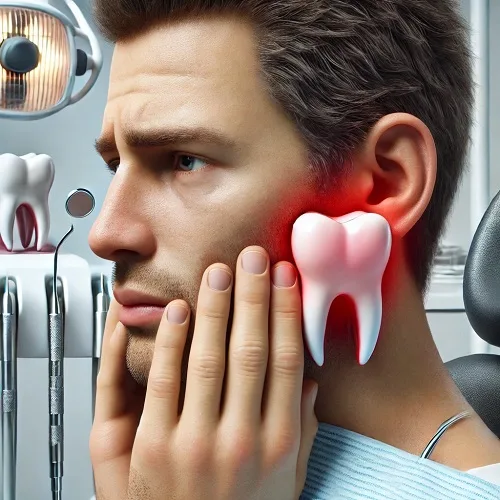
When a toothache is caused by a tooth infection, the pain doesn’t always stay confined to the mouth. Infections like abscesses or untreated tooth decay can lead to complications, causing discomfort to other parts of your head, including the ear. This happens when the infection spreads beyond the tooth and jaw, potentially reaching areas like the sinuses, the ear, or even the surrounding tissue.
A tooth infection often begins with tooth decay, which, if left untreated, can progress into a tooth abscess — a pocket of pus that forms at the root of the tooth. The infection can then spread to the surrounding tissues, including the gums and jaw, creating significant swelling and discomfort. As the infection worsens, it can exert pressure in the jaw, which may extend into the ear. This pressure can be intense and may mimic the feeling of an ear infection, even though the true cause lies in the tooth.
In some cases, a sinus infection can also develop as a result of a tooth infection. The upper teeth are located near the sinuses, and an untreated infection can easily spread to these areas, causing sinusitis. Sinus pressure can then lead to a sensation of ear pain, as the sinus cavities and ear structures are closely connected.
It’s important to understand that if a tooth infection is left untreated, it can continue to spread, leading to more severe complications, including persistent ear pain. Seeking prompt dental care for any tooth pain is crucial to prevent the infection from worsening and affecting your ears or other areas of your head. Early treatment can help avoid more serious health issues down the line.
The Role of the Temporomandibular Joint (TMJ) in Ear Pain
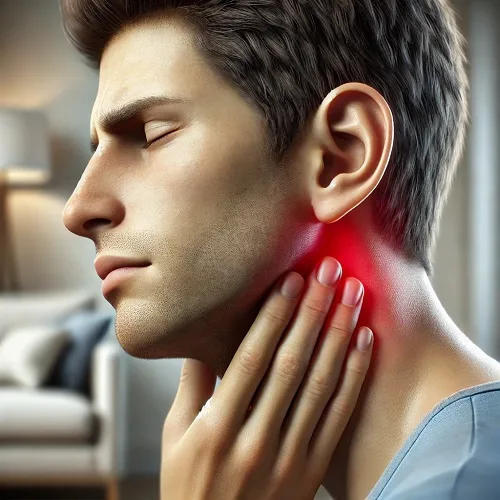
Another crucial factor in understanding how a toothache can cause ear pain is the temporomandibular joint (TMJ). The TMJ is the hinge that connects your jaw to the skull, and it plays a pivotal role in jaw movement. However, if this joint becomes dysfunctional — a condition known as TMJ disorder — it can lead to both jaw pain and earache, often in conjunction with toothache symptoms.
When the TMJ is misaligned or under stress, it can cause discomfort not only in the jaw but also in the surrounding areas, including the ear. Many people with TMJ disorders report experiencing facial pain, headaches, and earache, which can all be linked to the strain the joint places on nearby structures. The pain often originates from issues like dental misalignment, teeth grinding, or jaw clenching, all of which put added pressure on the TMJ and surrounding muscles.
One of the most common symptoms of a TMJ disorder is the sensation of ear pain that doesn’t stem from an actual ear infection. Instead, the pain arises from the tension and inflammation around the jaw and TMJ, which can radiate toward the ear. Grinding teeth during sleep is another common cause of TMJ issues, leading to both jaw pain and ear pain as the muscles and joints become fatigued from overuse.
A toothache caused by dental misalignment or other jaw-related issues can trigger or exacerbate a TMJ disorder, creating a cycle of discomfort that impacts both the jaw and the ear. If you’re experiencing ear pain alongside a toothache, it’s important to consider the role of the TMJ in this connection, as addressing the underlying TMJ disorder may provide significant relief for both your jaw and ear pain.
Other Possible Causes of Ear Pain Linked to Toothache
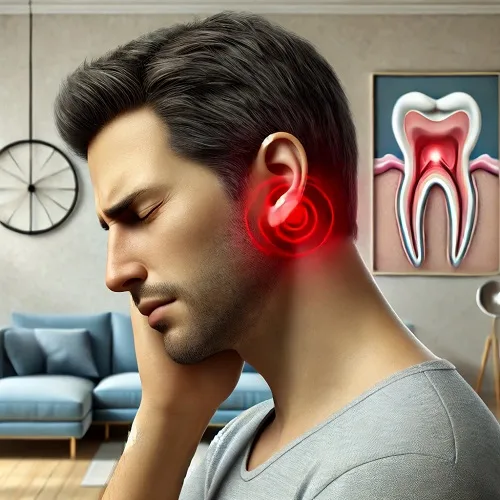
While a toothache can certainly lead to ear pain, it’s important to remember that there are other factors that could be contributing to the discomfort. In many cases, the pain radiating to the ear might not only stem from dental issues but could also be related to other conditions affecting your oral health and surrounding structures. Let’s explore some of the other common causes of ear pain that could be linked to a toothache.
One of the main conditions that could trigger ear pain alongside a toothache is a sinus infection. The upper teeth are located near the sinuses, and an infection in these areas can cause swelling and pressure that radiates to the ears. A sinus infection can make your teeth feel sore and lead to a sensation of fullness or earache, which can sometimes be mistaken for a dental issue.
Gum disease is another possible culprit when it comes to ear pain linked to a toothache. Infections or inflammation in the gums can lead to discomfort that radiates to the jaw and ear. In advanced stages, gum disease can affect the roots of the teeth, causing tooth pain and discomfort that may also involve the ear due to the proximity of the affected area.
Other contributing factors could include dental nerve issues, where inflammation or infection of the nerve can result in pain that spreads from the tooth to the ear. Teeth grinding or jaw clenching, often caused by stress, can also cause tension in the jaw and face, leading to both jaw pain and ear discomfort. Dental trauma, such as a chipped or cracked tooth, could also result in pain that affects the ear, especially if the trauma leads to nerve damage or inflammation.
As you can see, a variety of dental and health issues can contribute to ear pain in conjunction with a toothache. Understanding all potential causes helps ensure that you seek the right treatment to address both the toothache and any related symptoms, including ear pain.
RELATED POSTS
Can Toothache Cause Headache? Understanding This Painful Link
Pressure Pain on Root Canal Tooth: Common Causes and Treatments
The Ultimate Guide on How to Cure TMJ Permanently: Proven Solutions for Lasting Relief
Root Canal Recovery: A Comprehensive Guide for a Smooth Healing Process
When to See a Dentist or Doctor for Toothache and Ear Pain
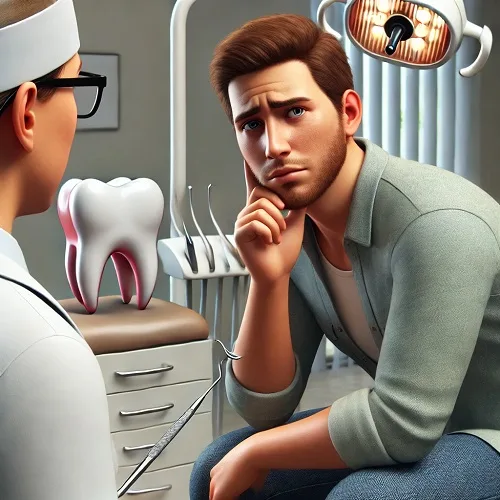
If you’re experiencing both toothache and ear pain, it’s important to understand when to seek professional help. While occasional discomfort might be manageable with over-the-counter pain relievers, there are times when the connection between these two symptoms requires immediate attention. Ignoring the issue could lead to more serious health problems.
First, if you have a toothache that persists for more than a couple of days and is accompanied by ear pain, it’s time for a dental consultation. A lingering tooth infection or abscess can worsen over time and potentially spread to surrounding tissues, including the ear. In these cases, seeking dental treatment as soon as possible can prevent more severe complications.
If the ear pain is intense, accompanied by swelling, fever, or drainage from the ear, it’s crucial to consult both a dentist and an ear pain doctor. These symptoms could indicate that the infection has spread, and immediate care is needed to avoid further health risks.
In cases where you have difficulty opening your mouth, experience jaw pain, or suspect a TMJ disorder, it’s advisable to see both a dentist and a specialist for emergency dental care. These symptoms can indicate a more complex problem, like dental misalignment or a TMJ issue, which may require a tailored treatment plan.
Prompt action can help address both your toothache and ear pain, providing relief and preventing potential complications. Don’t wait too long — the sooner you seek care, the better your chances of resolving the issue effectively.
Treatment Options for Toothache and Ear Pain
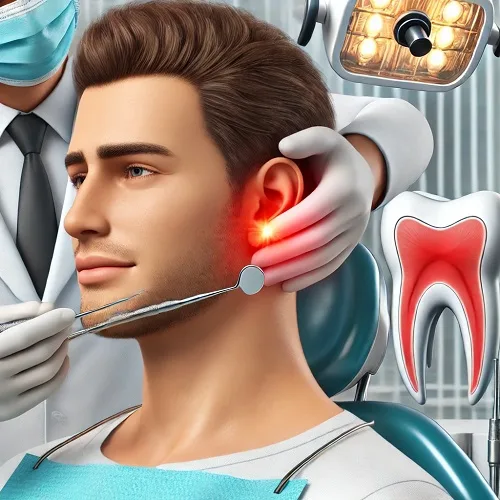
If you’re dealing with both a toothache and ear pain, you may be wondering what treatment options are available to help alleviate both issues. Thankfully, there are several effective treatments that can provide relief, address the root cause, and prevent further discomfort.
For tooth pain treatment, the first step is to address any underlying infection. If a tooth infection is the cause, your dentist may prescribe antibiotics to combat the infection and reduce swelling. Once the infection is under control, additional dental procedures such as a filling, root canal, or tooth extraction may be necessary, depending on the severity of the damage.
If your ear pain is linked to TMJ disorders, the treatment will focus on reducing jaw tension and inflammation. TMJ treatment can include physical therapy, mouth guards to prevent teeth grinding, and, in some cases, medications like anti-inflammatory drugs to reduce swelling and ease discomfort. For more persistent cases, your dentist may recommend specialized treatments or referrals to a TMJ specialist.
In some instances, if the ear pain is due to an ear infection, an ear infection treatment plan may involve prescribed antibiotics or over-the-counter pain relief to manage symptoms while the infection clears up.
Overall, treatment for both toothache and ear pain aims to address the source of the discomfort. Whether it’s antibiotics, dental procedures, or TMJ treatment, there are effective solutions that can bring relief and help you regain comfort. Acting early ensures a quicker recovery and a higher chance of avoiding long-term complications.
Preventing Toothache and Ear Pain: Tips for Oral Health
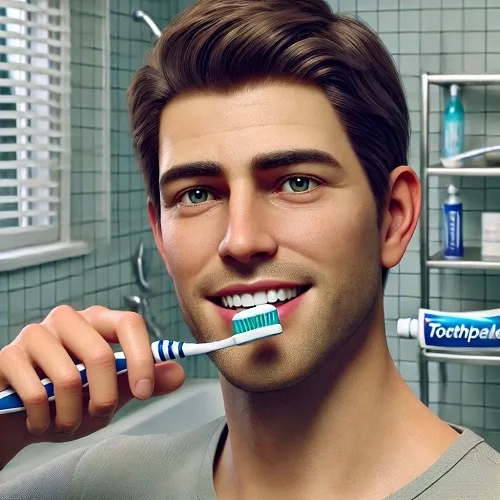
The best way to avoid the discomfort of both a toothache and ear pain is through proactive oral hygiene and regular dental care. Good dental habits not only help maintain tooth health but also prevent the spread of infections that could lead to ear pain.
First and foremost, brushing your teeth at least twice a day and flossing daily are essential for keeping your teeth and gums healthy. This helps remove plaque and bacteria that can cause tooth decay and gum disease, which are common culprits behind both toothache and ear pain. Using a fluoride toothpaste and a soft-bristled toothbrush will protect your teeth while ensuring your gums stay healthy.
In addition to brushing and flossing, it’s important to schedule regular checkups with your dentist. Routine dental visits are crucial for catching any issues early, such as tooth decay, dental misalignment, or gum infections, before they progress into more serious problems that could affect your ears. Teeth cleaning by a professional every six months can help prevent plaque buildup, which can lead to both tooth and gum problems.
To avoid toothache caused by teeth grinding or jaw clenching, consider using a mouth guard, especially if you notice these habits occurring at night. These preventive measures can help protect your teeth and jaw from strain, reducing the risk of ear pain caused by TMJ issues.
By maintaining good oral hygiene, staying on top of dental care, and attending regular checkups, you can significantly reduce your chances of developing both toothache and ear pain. Prevention is key to a healthier, pain-free smile and ear health.
Frequently Asked Questions (FAQs)
Can a Toothache Cause Ear Pain?
Yes, a toothache can cause ear pain due to referred pain, where the pain from your teeth or jaw is felt in your ear.
Is ear pain normal with a toothache?
Ear pain can be a common symptom when a toothache is present, especially if it involves the upper teeth or a jaw-related issue like TMJ.
Can a Tooth Abscess Affect Ears?
Yes, a tooth abscess can lead to ear pain if the infection spreads, affecting nearby tissues or causing swelling that radiates to the ear.
How does tooth pain radiate to the ear?
Tooth pain radiates to the ear due to shared nerve pathways in the jaw and ear area, which can cause discomfort to be felt in both locations.
Can an ear infection be caused by a toothache?
An ear infection from a toothache is rare, but an untreated tooth infection can spread, leading to complications in the ear, sinuses, or surrounding areas.
What’s the connection between tooth pain and jaw earache?
A jaw earache can occur because the jaw, teeth, and ear share common nerve pathways. A toothache can cause pain to be referred to the ear.
What are the signs of an ear infection caused by a toothache?
Signs of an ear infection caused by a toothache may include fever, swollen lymph nodes, drainage from the ear, and intense pain that extends to the jaw and ear.
Can a sinus infection cause ear pain from a toothache?
Yes, a sinus infection caused by a tooth infection can lead to ear pain, as the sinuses and ears are closely connected.
How can I tell if my ear pain is from a toothache?
If your ear pain is accompanied by tooth pain, especially in the upper teeth or jaw, it is likely related to the toothache.
Is it safe to wait for a toothache and ear pain to go away?
It’s not advisable to wait, as untreated infections can worsen and lead to more serious complications, such as spreading to the ear or sinuses.
Can TMJ cause ear pain from a toothache?
Yes, TMJ disorders can cause pain in both the jaw and the ear, often exacerbated by a toothache or dental misalignment.
When should I see a doctor for ear pain and a toothache?
If your toothache and ear pain persist for more than a couple of days, or if you have swelling, fever, or drainage, you should see both a dentist and an ear pain doctor.
Can teeth grinding cause ear pain?
Yes, teeth grinding can contribute to jaw pain and ear discomfort, especially if it leads to TMJ issues or tooth wear.
What treatments are available for toothache and ear pain?
Treatments may include antibiotics for infections, dental procedures to treat tooth damage, or TMJ treatments for jaw-related issues.
Can a tooth infection cause a serious ear problem?
If left untreated, a tooth infection can spread to surrounding areas, including the ear, leading to more severe problems like an ear infection or sinusitis.
Can poor oral hygiene lead to ear pain?
Yes, neglecting oral hygiene can lead to tooth decay and gum disease, which can cause toothaches that may radiate to the ear.
Conclusion
In conclusion, can a toothache cause ear pain? Yes, the toothache and ear pain connection is real, with factors like referred pain, infections, and TMJ disorders playing a key role. It’s important to address both issues early to avoid complications and potential health risks. Seeking timely earache relief and proper toothache treatment can not only alleviate discomfort but also prevent more severe problems down the road. By maintaining good oral hygiene, visiting your dentist regularly, and addressing pain as it arises, you can ensure better overall health and reduce the likelihood of both toothache and ear pain in the future.
References
- Mayo Clinic. (2023). TMJ disorders – Symptoms and causes.
- Duly Health and Care. (2023). Is It an Ear Infection, Tooth Pain, or Something Else?
- National Institute of Dental and Craniofacial Research. (2023). Jaw Pain (Temporomandibular Disorders)
- Health.com. (2023). Tooth Pain: Causes, Symptoms, and Treatment






